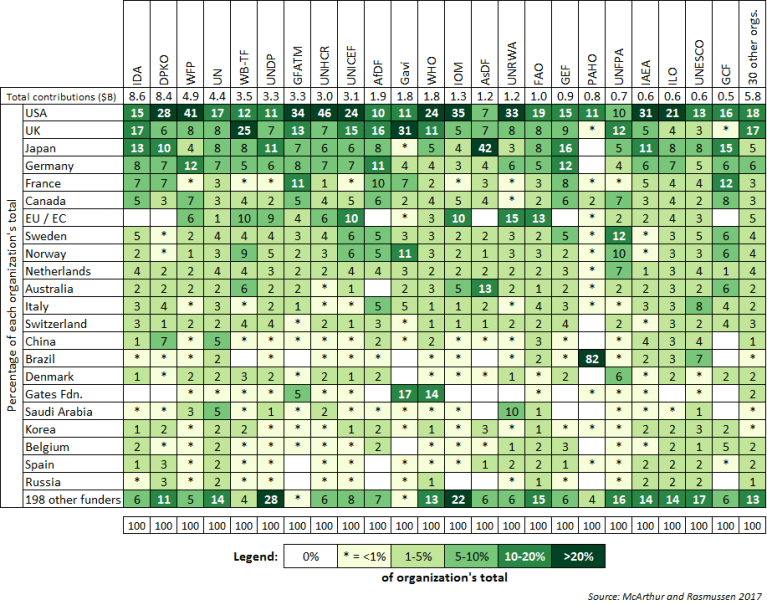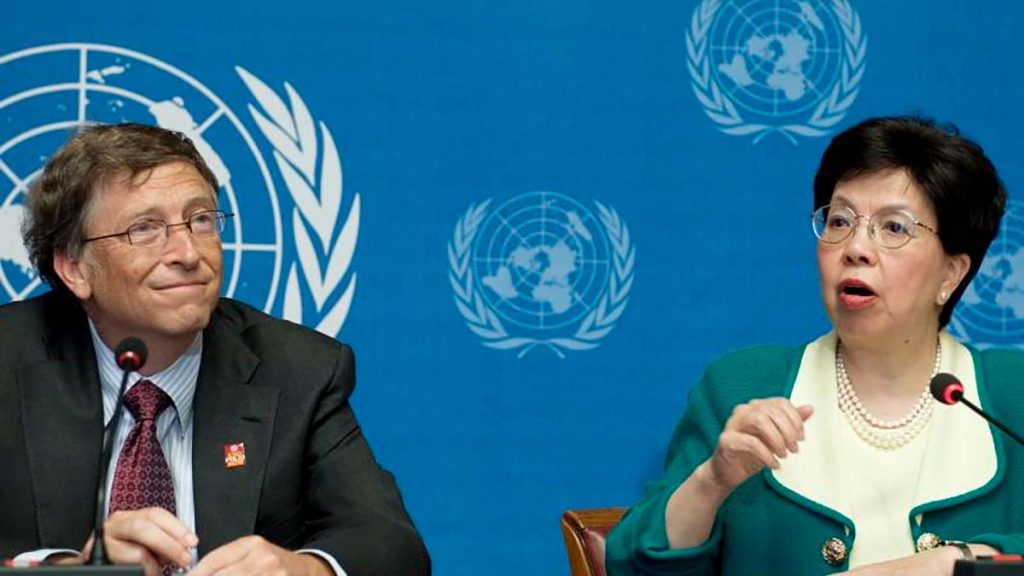Well, I did a quick search and according to this site (see link below) the Gates Foundation is the second largest funder after the U.S. government. The exact amounts maybe fluctuating, but from what I could find Gates funding in 2017 was ca
330 million, and the US in 2017 paid ca
0,5 billion (according to
THIS page). So, the US is the larger financier, but Gates is close behind.
And, according to
THIS page from 2018, the US funding of the WHO constitutes roughly about
24% of WHO:s total grants (see image). So, if the US suspends its funding, it
will make things difficult to the WHO.
Figure above: How important is each funder to each organization (% of grants)
Providing proof that the independence of the World Health Organization (WHO) has been severely compromised, a document from the 2018 annual meeting of the World

www.dr-rath-foundation.org
It's also interesting to see the other big donors of the WHO, no surprises here:
View attachment 35126
Since we're putting Bill Gates under the microscope a lot here (as people in general should have done long ago), I thought I'd share a weird thing that happened to me when I applied for a job at the Gates Foundation quite a number of years ago.
Some background to the story: some time in 2001, I went looking for a better job and decided to take another chance on Microsoft after going through a nasty experience there a few years before (my boss ridiculed me in front of the entire team, and fired me when I complained about it). I interviewed with two program managers who seemed like pretty decent guys. They seemed to like me back, but one of the questions they asked at the end of the interview struck me as pretty strange: They asked how I felt about difficult people. Feeling fairly relaxed in front of them, I was disposed to be generous and said I supposed difficult people had become that way due to the vicissitudes of life and I felt sorry for them.
After I left the interview the question started bothering me a lot. As I drove into the parking lot of the job I had at the time, the program managers called to tell me I had the job, but that night I was talking to my husband about that question and actually got to thinking about the difficult people in my life.
As a teenager, I worked for the local supermarket after school. During the summer, high school kids (of which I was one) were assigned full-time jobs at the supermarket. No one wanted to work for the woman who ran the staff cafeteria because she had a reputation for being a dragon and a very difficult person to deal with. As luck would have, I got the assignment to work as her helper, and discovered an odd thing: she was not difficult at all. She simply couldn't stand people who were lazy and didn't do things they way she wanted them done after she'd showed them how to do it. She was very upfront about what she needed. I paid attention, and we got on so well that she asked for me to come back as her helper the next summer.
That was a good experience with someone who was apparently difficult. My mother and stepfather were an entirely different matter. I won't bore you with the details, except to say that nothing ever pleased them and the more you tried, the more things they found to criticize you for.
Back to the job I'd been offered, after a long discussion with my husband, I concluded that, despite my good experience during high school, my experiences with my parents made me think life was too short to have to deal with difficult people. I decided the question was a warning, a red flag, and declined the job.
A year or so after that, in 2008, I was looking for a job during the economic downturn, which occurred not too long after the dot com crash. Jobs in my field were thin on the ground, so I was pretty much looking for anything. So I went to a job interview at the Gates Foundation. The woman was pleasant and I felt relaxed, and again got the impression that she liked me and I might actually get the job. However, at the end of the interview, she told me I'd have to be interviewed by one more person, who would only ask me one question. This was a surprise. I had expected her to say "Start on Monday".
The pleasant woman left the room and in came this tall, thin woman with a hard-looking face. She sat down and asked me The Question. I intended to say what I'd said to the guys at Microsoft - you know, the PC version - but before I could answer, something happened to my consciousness. I blipped out for a moment, and when I became fully conscious again, I was in the middle of saying that life's too short to have to deal with difficult people (!) exactly what I'd said to my husband a couple of years before...and the last time I'd given any thought to dealing with difficult people. I remember feeling extremely angry at the woman and not knowing how I got that way or why I was so angry with her. I also didn't know how I ended up saying what I really thought when I'd intended to do the opposite. Did she hypnotize me, or simply reach into my mind and somehow force me to say what I really thought? How did she do whatever she did so quickly?
This experienced has puzzled me for years. What the heck actually happened? It freaked me out so much that ever since, whenever a recruiter asks if I want to take a job at Microsoft I say NO without even finding out the particulars.






 . Well, this time good ol' Q might have done something useful – the tweet with the clip is being retweeted like crazy...going viral!
. Well, this time good ol' Q might have done something useful – the tweet with the clip is being retweeted like crazy...going viral!